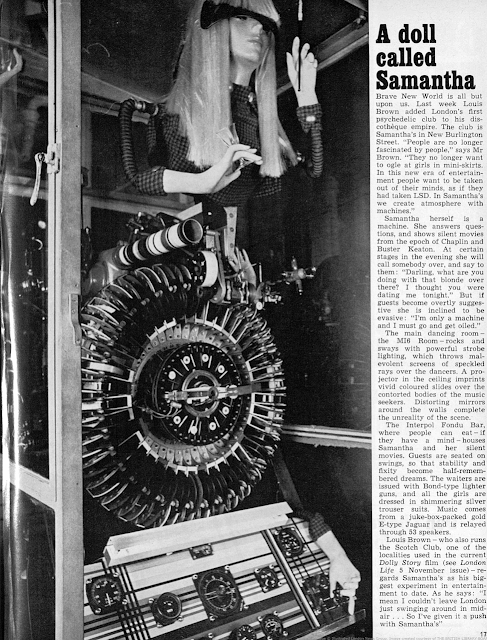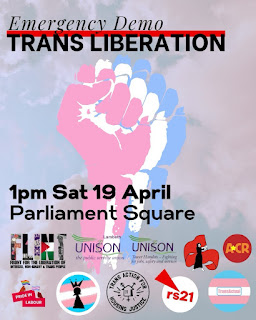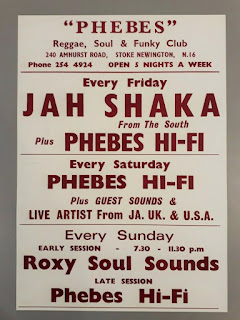Wednesday, August 06, 2025
'Youths fight police kill-joys' (1977) - cops at Bob Marley and Delroy Wilson gigs
Wednesday, July 23, 2025
London Life 1966: Discotheques, Psychedelic Samantha's and Francoise Hardy at the Savoy
 |
| London Life cover, 31 December 1966 |
London Life was a mid-1960s what's on magazine that for a little while replaced the Tatler to reflect a shift away from conservative posho style guide towards a more socially democratic swingin' London - tellingly by the end of the 1960s it had reverted to its former name and to being a conservative posho etc.
'Discotheques' were included in the listings, still quite a new phenomenon in UK so with the helpful explanation that these were 'Informal nightclubs and restaurants with dancing, usually to gramophone records. Some discothèques feature musicians from time to time'. Most of these don't sound too appetising, a lot of gambling and no doubt overpriced drinks (overpriced for the time - a goldfinger cocktail at the Hilton for 35p sounds very reasonable now!). Still wouldn't mind a time machine to check out the Flamingo or to see Francoise Hardy at the Savoy in January 1966.
 |
| London Life, 29 January 1966 |
And what of Samantha's in New Burlington Street, described in 1966 as 'London's first psychedelic club' promising to 'create atmosphere with machines' for people who 'want to be taken out of their minds as if they had taken LSD'. All with a talking dummy called Samantha and a dancefloor with 'powerful strobe lighting, which throws malevolent screens of speckled rays over the dancers' while 'a projector in the ceiling imprints vivid coloured slides over the contorted bodies of the music seekers'.
 |
| London Life, 12 November 1966 |
Sunday, April 20, 2025
Trans Liberation demo in London
Friday, April 18, 2025
Autonomous Astronauts: Intergalactic conferences and raves in space
On the 30th anniversary of its founding, the Association of Autonomous Astronauts will be remembered at the MayDay Rooms in London:
 |
| inside the Rave In Space, Link, Bologna, 1998 |
Previous AAA posts:
Everybody is a Star! - Disconaut AAA
Summer Solstice 1999: AAA on Parliament Hill
Military out of space - AAA at J18 Carnival Against Capital 1999
AAA at Brixton Reclaim the Streets 1998
Skinheads as Independent Travellers in Space
We were brought up on the space race, now they expect us to clean toilets
Saturday, March 01, 2025
Denzil Forrester in Lives Less Ordinary
In an ArtCornwall interview Forrester has recalled this time in the 1980s:
'I grew up in Stoke Newington and Hackney, and a lot of the paintings...are to do with the nightclubs in the Dalston area, mainly Jah Shaka sound system; mainly the dub reggae sound systems in the early days... I used to go to the London nightclubs and make drawings to the length of a record, which is about 3 or 4 minutes.
So I'll have A1 paper, it's dark, and I can't really see what I'm doing, so I'm going for the movement, the action, the expression of the people. I'll make the drawings, and take them to the studio and use them for making the big paintings in the studio... London was a very active, vibrant, colourful place then. It was cheaper and freer to live there then too. You could squat a house. So I was in a squat for about 5 to 6 years in Clissold Road. It was easier because an artist could have lots of space. And there was an energy there. Particularly the dub nightclubs. Jah Shaka, the Rastafarians, basically they'd dress up, they'd dance and play their monosystems, and I wanted to capture that energy'.
Tuesday, October 01, 2024
London nightlife not dead shock
Dan Hancox has written a great piece on 'Debunking the weird myths about London's 24-hour party people' in which he takes to task some dubious claims made in the Times and elsewhere that London nightlife is in terminal decline. He rightly critiques some very dubious data, such as relying on Google Maps to show venues with late night licenses.
Specifically he skewers a map included in the Times article 'UK’s worst night out? Costly, crime-ridden London' (27 September 2024) which purports to show venues open after 2 am on Saturday nights. Using his local knowledge of Peckham’s Rye Lane he shows that in addition to three venues shown on map (Tola, the Prince of Peckham, and the Bussey Building) there are many other places: 'My raver alarm immediately went off. Just from going out dancing in Peckham, I know that this is rubbish. That list is missing the Carpet Shop (open till 4am), Peckham Audio (4am), Peckham Levels (4am, albeit occasionally) and Four Quarters (3am). There are also at least five pubs I can think of around Rye Lane which open until 1am on a Saturday night, new audiophile bar Jumbi is open until 2am' etc. etc.
As Dan points out this 'London Declinism mingles with the fog of racist myths' that London is a hotbed of random violence overseen by a muslim mayor implementing sharia law! Sometimes these kind of articles are really just snotty refusals to recognise that London actually exists beyond the centre of town - see for instance Bloomsbury resident Will Lloyd's 'Sadiq Khan’s silent city' (New Statesman, 24 March 2024) which begrudgingly admits that he 'could walk north to the Lexington (open until around 3am, but it smells), or south into London’s warm, unwashed armpit'.
There is also a well meaning but in my view wrong-headed left wing version of the argument highlighting that many venues are being squeezed out by property development and other pressures (true) and suggesting that there is no longer any grass roots/'underground' clubbing because its all been taken over by corporate giants (false).
Of course there are peaks and troughs, periods when everybody seems to be out clubbing and times when it is a bit more based around niche subcultures. But we also have to beware observer bias. We all have our peak periods for partying, the worse thing is to imagine that because you are personally not going out as much as you used to do that it is not happening any more, or that it's not as good or real or whatever as it used to be. People have been out dancing in London for hundreds, probably thousands of years and it is not stopping any time soon (see for instance this great account of London dancing from 1902).
Things do change but not necessarily for the worst. The demise of some of the old school high street nightclubs that hungover from the pre-rave period, some of them with long histories of racist and sexist door policies, is not necessarily a bad thing. Dance music no longer always requires specialist DJs or sound rigs, great as it is to have them. There is a more diffuse nightlife in which a pub can quickly become a dancefloor, or people can summon one up anywhere playing music from their phones through speakers. These nights might never show up on Resident Advisor or be documented anywhere but they are happening all around us in London and anywhere else with a pulse. My South London local for instance - a pub that used to be pretty much empty much of the week - is full most nights, sometimes people are watching sport, sometimes listening to a folk session, and sometimes it erupts into dancing. And of course as Dan points out there are countless actual club nights, gigs and other events of all sizes happening all the time.
Historically in London it is pub and restaurant backrooms, railway arches and other places off the mainstream nightlife map that have spawned new music scenes. Think about the emergence of the new jazz scene in the last ten years where places like Buster Mantis (a Jamaican bar/restaurant) and Matchstick Piehouse (a community arts/music space) hosted the Steam Down nights in Deptford, many of whose alumni are now internationally known. I suspect that such places are not even on the radar of many of those decrying the death of London nightlife.
Monday, August 26, 2024
Saturday, July 27, 2024
Art Not Evidence: against the criminalisation of rap and drill
 |
| Art Not Evidence posters in Camberwell, South London, July 2024 |
'Art Not Evidence is a growing coalition of lawyers, journalists, artists, academics, youth workers, music industry professionals and human rights campaigners working together to fight the criminalisation of rap music in UK courts'. Here's their statement:
'In recent years, courtrooms across the country have gained an alarming new soundtrack. Prosecutors — with increasing frequency — put lyrics, music videos, and audio recordings in front of juries to help secure criminal convictions. In many cases, these creative expressions have no connection to the serious crimes alleged, and are used to paint a misleading and prejudicial picture, conflating art with evidence.
Specifically, police and prosecutors use the act of writing, performing, or even engaging with rap music to suggest motive, intention, or propensity for criminal behaviour. This is particularly prevalent in controversial "joint enterprise" and conspiracy cases, in which music, lyrics, and videos are used to drag multiple people into criminal charges, often under sweeping definitions of “gang” activity. This practice disproportionately affects young Black men and boys from under-resourced, marginalised communities. It is an agent of institutional racism.
Rap music, including the drill sub-genre, is one of the most popular forms of music across the country, and a significant cultural force, producing Glastonbury and Wireless headliners, multiple industry award winners, and enjoying an artistic influence that extends into film, literature, television, and the visual arts.
Yet, despite being known for its storytelling, symbolism, figurative language, and hyperbole, police and prosecutors invite judge and jury to take rap music literally, as direct evidence of criminal intent or behaviour.
Research produced by journalists and university academics have identified over 100 cases in the UK since 2005 in which rap music was used as evidence. The majority of these cases involved multiple defendants, making use of the doctrine of joint enterprise. In the last three years alone, at least 240 people have had their fate in court decided, at least in part, by their taste in music.
This is an urgent issue, and one which demands an urgent response.
The indiscriminate use of creative expression as evidence in court risks miscarriages of justice, perpetuates harmful racist stereotypes, and contributes to a racially discriminatory criminal justice system that stifles creativity and freedom of expression. We applaud law reform campaigns in the USA, including the enactment of legislation in California, and urge judges, lawyers and legislators in the UK to follow suit.
We call for police and prosecutors to stop relying on irrelevant, unreliable, and highly prejudicial evidence in pursuit of convictions; for defence lawyers to challenge prosecutors; and for judges to exclude such evidence.
We propose legal reform to limit the admissibility of creative expression as evidence in the criminal courts.
We seek justice, and your support, in our mission to achieve it'.
Friday, March 08, 2024
Institute of Goa 1995 (plus Trends/Trenz in Stoke Newington)
 |
| Deptford Urban Free Festival 1995, held in Fordham Park SE14 ('Anti CJA=Freedom') |
Tuesday, December 26, 2023
My London musical/radical soundscape 2023
Reading other people's end of year lists is like listening to people talking about their dreams - occasionally interesting but mostly very much not. So this round up of musicking and political activity from (mostly) London 2023 is really for my own benefit and to document a few things which might otherwise vanish from the historical record or at least my memory.
Best gig of the year for me was Kneecap at the Electric Ballroom in Camden, a giant mosh pit in a sold out gig for Belfast Irish language rappers. Just up the road at the Roundhouse in December, Lankum were also excellent. Irish hegemony in my music tastes for the first time since the 1990s. Love the Roundhouse (also saw Big Moon there in May and a couple of years ago Laura Marling), not so keen on the cavernous Ally Pally where I saw Sleaford Mods with John Grant, but a good gig.
On a jazzier tip, loved Ezra Collective at Hammersmith Apollo in February, and Laura Misch's mellow cloud bath performance at the Peckham Old Waiting Room. Nearby at the Ivy House pub SE15, The Goose is Out continued to curate some excellent folk nights including Martin Carthy and Stick in the Wheel. They also put on a monthly singaround session where people take it in turns to stand and sing one song at a time; I sang there earlier in the year and also at Archie Shuttler's Open Mic at the Old Nun's Head. Strummed the banjo and mandolin a bit.
In terms of my own music making the highlight was taking part in the Wavelength Orchestra event on the beach in Gravesend in June, an improvisational performance where assorted musicians sustained notes based on the duration of waves (although it was low tide and they were more like ripples). I took along my old Wasp synth, my dad's bagpipe chanter and my grandad's harmonica to add to the mix.
Went out for my birthday to a Mungo's Hi Fi night at the Fox & Firkin in Lewisham, checked out my local Planet Wax record shop and bar in New Cross. Enjoyed giving a Peckham anti fascist history walk for around 30 people in October, and chatting about my own history on Controlled Weirdness' 'Tales from a disappearing city' podcast.
I always appreciate the unexpected random encounters with music in the city, like coming across an Italian hip hop collective (Hip Hopera Foundation) performing in Beckenham Place Park or bumping into morris dancers by my local pub. Loved dodging the rising tide on the Thames shore for a dark 'Noise TAZ' in the summer.
Politically I am not a super activist at the moment but do try and get myself out there in times of emergency - and with climate change, war, anti-migrant racism and transphobic 'culture wars' it feels like that is most of the time at present. Or as Benjamin put it, 'The tradition of the oppressed teaches us that the ‘state of emergency’ in which we live is not the exception but the rule'.
The year started with ongoing strikes from NHS, rail workers and teachers, I popped down to various picket lines and protests. It has been hard to keep track of the endless state onslaught against refugees, including the 'Illegal Migration Act' which criminalised seeking asylum. Protest too becoming increasingly criminalised with climate emergency activists being locked up for months or even years just for walking in the road or doing a banner drop. My most sustained activity was turning up regularly to defend a drag event at the Honor Oak pub in South London from far right opposition (which I wrote about at Datacide). I got increasingly fed up with anti-trans nonsense from fellow old lefties and said so. The end of the year dominated by the massacre of October 7th and the seemingly never ending massacre in Gaza ever since - highlighted by both Kneecap and Lankum at their gigs.
Perhaps it remains true, as Frederic Jameson said, that 'it is easier to imagine the end of the world than to imagine the end of capitalism', but the neo-liberal capitalist utopia of a world united and pacified by globalised markets has vanished too. It is not hard to imagine a kind of end of capitalism as we know it, at least as a global system, replaced by endless ethno-nationalist violence and conflict for shrinking resources like water and arable land. Harder sometimes to hold onto a politics of hope for a better world, but what is the alternative?
 |
| 'South London Loves Trans People' - at the Honor Oak pub in May |
 |
| Stop the Migration Bill protest at Westminster with speakers on Fire Brigades Union fire engine (13 March 2023) |
 |
| Refugee solidarity on London anti-racist demo, 18 March 2023 |
 |
| Gaza ceasefire demo blockades Carnaby Street, 23 December 2023 |
Anyway here's a slice of London's musical/radical soundscape as experienced by me in 2023:
1. Striking Lewisham teachers, January 2023.
2. Ezra Collective perform Space is the Place, Hammersmith Apollo, February 2023.
3./4./5. Extinction Rebellion demo in London, April 22 2023.
7. Wavelength Orchestra in Gravesend (OK not actually London) on beach next to St Andrews Art Centre, June 2023
8./9. Dancing in the streets in Honor Oak, defending drag event from far right opposition, 24 June 2023
10. Stick in the Wheel at at Goose is Out folk club at the Ivy House SE15, June 2023
11. Torquon on Thames Beach, Noise TAZ, 19 August 2023
12. Khabat Abas, Thames Beach Noise TAZ, 19 August 2023 (Kurdish experimental cellist)
13 Leslie, Hilly fields, September 2023 (pop up electronic performance in the park)
14. Blanc Sceol, Deptford Creekside Discovery Centre, September 2023 (acid sounds on self made acoustic instruments as part of 'Thorness and Green Man' autumn equinox performance with artist Victoria Rance)
15 Cyka Psyko - Sardinian rapper with Hip Hopera Foundation, Beckenham Place Park, 24 September 2023
16. Laura Misch in Peckham 21 October 2023
17. Palestine demo, Battersea, 11 November 2023
18. Kneecap, Electric Ballroom, 29 November 2023
19. Sleaford Mods cover West End Girls at Ally Pally 2 December 3034
20. Lankum singing The Pogues' Old Main Drag to remember Shane MacGowan at the Roundhouse, 13 December 2023.
21. Palestine demo, Carnaby Street, 23 December 2023
Sunday, December 24, 2023
'Do not play acid' - London club listings October 1988
Thursday, September 07, 2023
Stop the City, London, September 1984
 |
| Guardian: 'Police swamp City's 2,000 anarchists' |







































